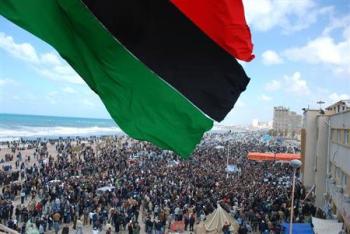 Marcello Foa explains the political context of recent events in North Africa.
Marcello Foa explains the political context of recent events in North Africa.
To understand what is happening in Tripoli, we must first consider the complete strategic picture. We’re not looking at spontaneous uprisings, but rather actions encouraged in an effort to replicate in North Africa what took place in the former Soviet Union at the end of the 80’s. At that time the insurgence also began in a small country – Lithuania – and initially no one would have imagined the fire would spread to neighboring countries. The notion that the Soviet Union could implode was unfathomable. The Maghreb is not the Soviet Union and there are no superstructures to blow out, however the parallels are apparent. Tunisia is the smallest country in the region and it served as a fuse igniting others. On its heels the Mubarak regime fell, Libya sank into turmoil and tomorrow it could be Teheran, perhaps even Algeria, Morocco and Syria will follow. What did the regimes of Tunisia, Egypt, and Libya have in common? The fact that their leaders were authoritarian, old at this point, discredited, and planning to hand power over to their children or other inept henchmen.
It’s no mystery that the uprisings were amply encouraged – and in many ways arranged – by the U.S. government. Washington had considered the explosion of popular malcontent inevitable for some time, and fearing that Islamic extremists or radical groups might guide the revolt, proceeded with what appears to be a controlled explosion, at least in Egypt and Tunisia. Why do I say controlled? Because before making things difficult for Ben Ali and Mubarak, the Obama Administration reinforced its already solid relationship with the military in these countries, which, in fact, never lost control of the situation and took responsibility for the revolution. Let’s not forget that today it is the generals who are in charge in Cairo and Tunis, and they’ll continue exert a decisive influence in the future as well. In a sense Washington has won twice. It secured the loyalty of these two countries for many years to come, while simultaneously scoring greatly in terms of public image, showing the whole world that America is on the side of the people and of democracy, even with regard to regimes that were seen as friends mere days ago.
The dynamics in Libya differ as Gadhafi was not a U.S. ally and because the NGOs linked to the U.S. government were unable to establish contacts and ties with the civil society in Libya; in other words, they weren’t able to fertilize the soil on which to grow the uprising. It burst forth nevertheless, by way of contagion and feeding of not the army’s loyalty, but its malcontent. As is the case in all revolutions, the army decides the outcome of popular revolt. In these hours Gadhafi is paying for mistakes made in the past. As Domenico Quirico pointed out in La Stampa, the Colonel, old coup leader that he is, never trusted the generals and proceeded to purge them a number of times. The men in uniform feared him for 42 years, and never exactly came to love him. As a result, now many are either taking flight or passing over to the side of the rebels, particularly in towns far from Tripoli. Gadhafi can only count on the private militias and a small component of the army. This is the reason for a move that is otherwise hard to explain: the recruitment of hundreds or maybe thousands of African militants.
The consequences are inevitable: blood, blood and more blood. The impression is that Gadhafi in the end will be forced to flee. The ridiculous image of the Rais in a car with an umbrella brings back images of Saddam Hussein as he was hunted down by the Americans during the fall of Baghdad. In any case the situation could prove to be very embarrassing for Italy. Should the regime fall, Libya will once again be the port of departure for tens of thousands of immigrants heading toward Italy’s coasts. If the regime holds, it would be embarrassing to maintain relations with a leader who has blood on his hands. And in both cases million dollar contracts that our companies have with Libya will totter. ENI above all. Remember, a good portion of our energy supply comes from North Africa. There is a risk that the “controlled’ explosion could be, in any case, devastating for the commercial interests of our country.
Original posting can be found in Italian on Marcello Foa’s blog or on EJO’s Italian site.
Tags: Ben Ali, Domenico Quirico, Egypt, ENI, Foreign Coverage, Gadhafi, International News, Italy, La Stampa, Libya, Maghreb, Marcello Foa, Mubarak, NGOs, North Africa, Obama Administration, Political Spin, Soviet Union, Tripoli, Tunisia, U.S. Government













































